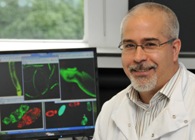Adapting breakthrough biotechnologies to tackle parasitic worms

Professor Karl Hoffman
10 October 2014
A perspective on developing innovative state of the art approaches to manipulate parasitic worms for advancing vaccines and drugs to control them is published today (Friday 10 October) in Science, the journal of AAAS – the American Association for the Advancement of Science.
Aberystwyth University parasitologist Professor Karl Hoffmann is the lead author of the perspective Halting harmful helminths. Vaccines and new drugs are needed to combat parasitic worm infections.
Professor Hoffman is working with colleagues in George Washington University in Washington D.C. and the Wellcome Trust Sanger Institute in Cambridge.
More than 300 million people are infected each year with parasitic flatworms (helminths). The diseases caused by these pathogens are typically chronic but frequently deadly.
They are among the 17 neglected tropical diseases listed by the United Nations World Health Organization, and infections by these flatworms cause over 4 million disability-adjusted life years to be lost annually, although this vastly underestimates the true impact that such long-term and chronic illnesses can have.
Historically considered restricted to the tropics and subtropics, suitable habitats for transmission of these parasites are now expanding into Europe and conditions are right for similar expansions to other continents.
Professor Hoffmann said; “The lack of vaccines perpetuates the current but unsustainable over-reliance on single-drug chemotherapies, leading to a potentially catastrophic situation unless new solutions are found.
To accelerate the discovery of new vaccines and drugs and to provide exploitable insights into how these parasites develop, there has been a drive to adapt state-of-the art technologies to parasitic worm research.”
With mammals, great strides have been made in this arena by harnessing new technologies and strategies to revolutionise the way in which scientific studies are performed. These include the generation of transgenic animals, the application of cellular genome editing (replacing, deleting or adding DNA sequences) and the manipulation of stem cells. Using these techniques has improved knowledge of gene function, which in turn has advanced biomedical discoveries important to many human health conditions.
By contrast, comparable research on helminths has lagged far behind.
The difficulty in maintaining parasitic flatworms in the laboratory due to their complex life cycles (often requiring two different hosts) present major bottlenecks for adapting these state-of-the-art technologies.
Despite this hurdle, progress has recently been made in developing basic systems for manipulating gene function and cultivating flatworm stem cells. By applying advanced methodologies for more selective genome alterations and increasing the scope of stem cell manipulations, breakthroughs will quickly arise and spur deeper investigations of flatworm biology and pathogenicity.
For the first time, application of cutting-edge resources will enable parasitologists to address fundamental evolutionary, biomedical, and immunological questions that have hampered the development of new treatments.
Answers to these questions could open up exciting new frontiers in translational options needed to control the damage caused by the neglected helminth pathogens responsible for significant human suffering.
IBERS
The Institute of Biological, Environmental and Rural Sciences (IBERS) is an internationally recognised research and teaching centre providing a unique base for research in response to global challenges such as food security, bioenergy and sustainability, and the impacts of climate change. IBERS scientists conduct basic, strategic and applied research from genes and molecules to organisms and the environment.
IBERS receives strategic research funding of £10.5m from the BBSRC to support long term mission driven research, and is a member of the National Institutes of Bioscience. IBERS also benefits from financial support from the Welsh Government, DEFRA and the European Union.
AU43414



